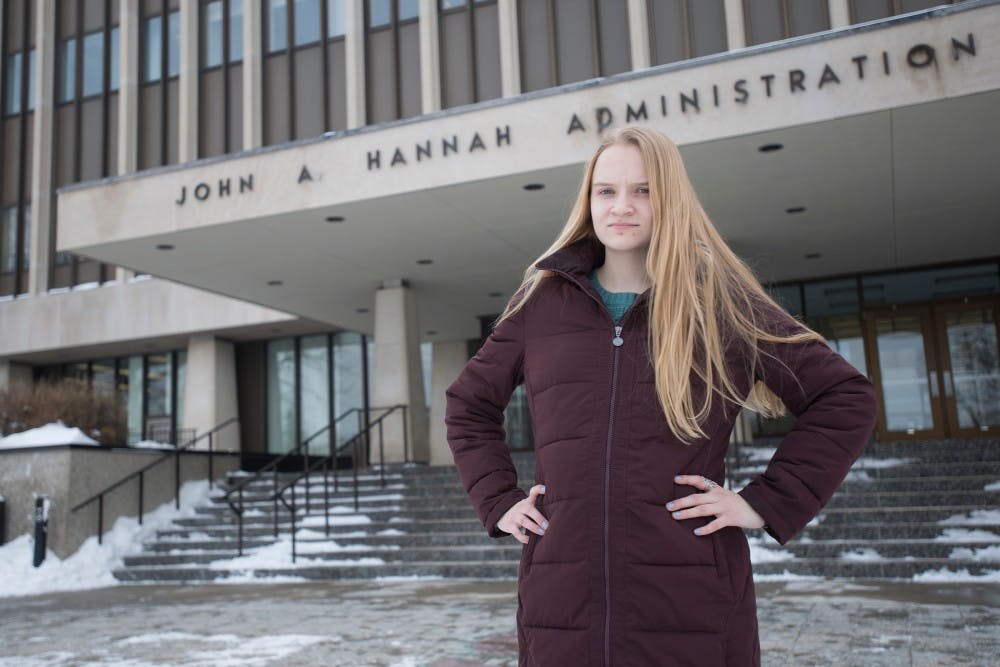As finals week loomed last semester, exams were far from the minds of some MSU students. Closer at hand was the revelation that George Will had been selected as a speaker for fall commencement.
The Washington Post columnist had incited outrage over a June column that said rape survivors on college campuses saw victimhood as “a coveted status that confers privileges.”
Activists at MSU came out in force. On Dec. 10, students marched up the steps of the Hannah Administration Building to stage a sit-in in front of MSU President Lou Anna K. Simon’s office for several hours. Leading the protestors was Emily Kollaritsch.
In photos of the demonstration, however, Kollaritsch does not appear like a leader. She carries herself demurely, without the bravado of an archetypal activist. When the protesters posed on the building’s steps, she stood at the back of the crowd, without a sign or banner.
That’s in large part because Kollaritsch is not used to the role of outspoken advocate, much less protest leader. Until recently, Kollaritsch had remained publicly silent about her experiences at MSU.
Kollaritsch, a social relations and policy senior, was the anonymous student in an April 2014 investigation by The State News, which detailed the 285 days it took for MSU to investigate her sexual misconduct claim, and how the university’s sanctions had done little to make her feel safe. But now she has broken her silence.
“I was so fed up with the university trying to cover up sexual assault,” she said.
As the news of student resistance to Will’s appearance spread, first across Michigan and eventually becoming a national story, Kollaritsch became the de facto student face of the movement because she is, in effect, the only vocal sexual assault survivor at MSU openly confronting the administration.
Her movement into the public eye has not been a smooth or easy transition. But it’s the closest thing she has to catharsis.
“Doing this work kind of gives me the peace I had been fighting for,” she said.
Not alone
When I first interviewed Kollaritsch last March at a local coffee house, she brought a friend.
This was not anything unusual. When reporting on victims of any sort of traumatic experience, it’s not uncommon to have an advocate present, a friend that can offer emotional support and clarification the survivor might otherwise have difficulty addressing.
But it wasn’t until I spoke to the friend that I learned she was not from MSU, but from Massachusetts Institute of Technology, and was only visiting.
I later learned Kollaritsch had met her through a coalition of sexual assault survivors online, known by its members as the survivor network. It is an informal group which has, in just a few years, transformed the national dialogue on campus sexual assault.
The network is comprised primarily of sexual assault survivors from universities across the U.S. such as Swarthmore College, Yale University, Arizona State University, Harvard University and the University of North Carolina.
“It’s sort of a source for us to gather support, a support network,” Kollaritsch said. “Like, if any of us are dealing with PTSD or anything, we’re kind of all there for each other.”
But perhaps more significantly, the network also served as a platform for the survivors to organize a coordinated campaign for institutional reform within their own universities, through the filing of Title IX complaints with the U.S. Department of Education’s Office of Civil Rights.
“When we had first all gathered together, the majority of us were filing complaints with the OCR. We were all helping each other,” Kollaritsch said. “We had made documents about how to best write an OCR Title IX complaint and the different violations to put on there.”
The network also contains a core of professional advocates who lend their expertise to the students. Laura Dunn, the founder and CEO of SurvJustice, a sexual assault advocacy group, said Kollaritsch immediately stood out.
“Emily was one of those survivors who definitely stood out as someone who was seeking to make change and, quite frankly, needed a lot of legal assistance on her campus, because everything I ever understood was that the campus was not serious about her safety,” Dunn said.
Outside of legal advice, though, Dunn also encouraged survivors to share their stories with the media. Dunn, a sexual assault survivor herself, had shared her own experience with media outlets like NPR, Rolling Stone and Al Jazeera.
“Originally the group was founded by pretty open survivors and that was definitely something we helped each other with, doing media contacts and encouraging people to share their story,” Dunn said. “I wanted people to speak out. I think that’s how you change sexual violence. The more you speak out, the more change happens.”
Kollaritsch’s story later also appeared in Harper’s Weekly, again as an anonymous source.
What began as only a small cohort in the survivor network has grown today into a community of 600 to 800 members, Dunn said.
In the group, Kollaritsch met Sarah Tedesco, a survivor from Emerson College whose story has since received national prominence. Although the two have never met in person, Tedesco described Kollaritsch as “one of her best friends,” and said they shared a unique bond.
“I often refer to it as ‘sisters of the same pain,’” Tedesco said. “It’s sort of a connection I don’t think a lot of people can understand ... that feeling of being violated and that feeling of our colleges and our families and different support systems not being there in the way they need to be after something like this happens.”
Five weeks before I met Kollaritsch, she had traveled to Boston to visit other survivors, including her friend from MIT.
“It was very significant, realizing I’m not alone and realizing there (are) all these other people there,” she said.
A platform
Her advocacy doesn’t come easily.
Diagnosed with anxiety and post-traumatic stress disorder, when speaking her voice wavers between the confidence that comes with strong convictions and the fragility of an individual still feeling the trauma of her experiences.
Still, she said she is learning how to better advocate.
“I know more so how to do it. It’s still hard to do because of my PTSD,” she said. “I always have to set limits for myself and know what I can and what I can’t do.”
Kollaritsch’s dealings with the MSU administration, more than anything, are defined by frustration. This past spring, Kollaritsch said she was raped by someone she believed was her friend.
While she said prosecutors are currently reviewing the case, the Office for Inclusion and Intercultural Initiatives approached her about a university investigation.
She said she requested an advocate to accompany her to the meetings and take notes because of her PTSD and a hearing impairment, but the university denied the request.
As a result, Kollaritsch chose not to move forward with an I3 investigation again.
Tedesco described her as “unbelievably resilient.”
“I don’t know another survivor who’s gone through what she’s gone through, on a campus that isn’t doing too much,” Tedesco said. “I think she’s doing incredible things because she doesn’t have that big support system with her on campus.”
In other universities under federal investigation, multiple survivors have come forward about their experiences, but at MSU, Kollaritsch is alone in her outspokenness.
“I think Emily has had a hard time because there are people there, but they’re not being as vocal as she is,” Tedesco said. They’re not fighting the system like she wants to.”
The protests against George Will, Kollaritsch said, was one of the first times she received “a platform to speak out.”
MSU Students United organizer Duncan Tarr said that organization along with the new group Community Leaders In Transformation aim to provide that platform.
“Organizations I’ve been a part of have done our best to elevate her voice and the voices of other survivors who have had similar experiences,” Tarr said.
Since this is Kollaritsch’s last semester at MSU, she said her decision to speak has little to do with her.
“Basically it was my determination to give survivors a voice that they didn’t otherwise have,” Kollaritsch said.







